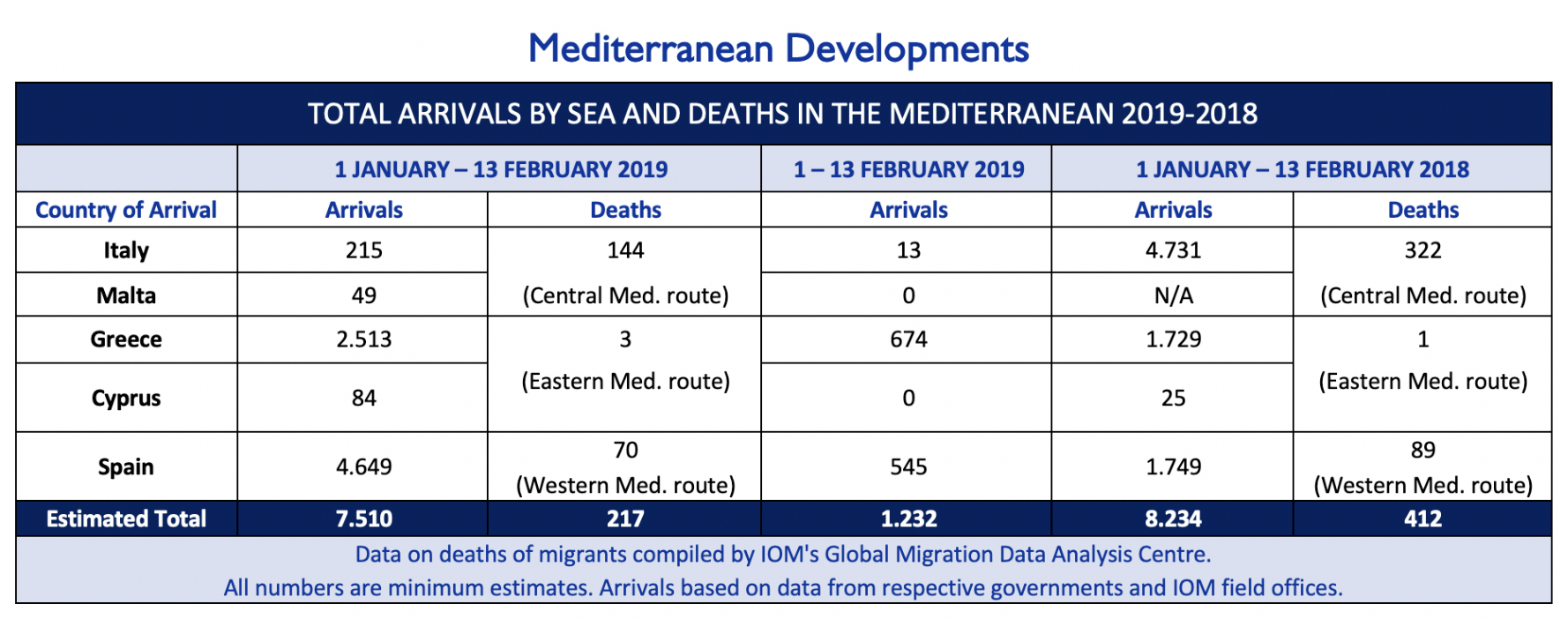-
Who we are
WHO WE AREThe International Organization for Migration (IOM) is part of the United Nations System as the leading inter-governmental organization promoting since 1951 humane and orderly migration for the benefit of all, with 175 member states and a presence in 171 countries.
-
Our Work
Our WorkAs the leading inter-governmental organization promoting since 1951 humane and orderly migration, IOM plays a key role to support the achievement of the 2030 Agenda through different areas of intervention that connect both humanitarian assistance and sustainable development.
What We Do
What We Do
Partnerships
Partnerships
Highlights
Highlights
- Where we work
-
Take Action
Take Action
Work with us
Work with us
Get involved
Get involved
- Data and Research
- 2030 Agenda
Mediterranean Migrant Arrivals Reach 7,510 in 2019; Deaths Reach 217
Geneva – The International Organization for Migration (IOM) reports that 7,510 migrants and refugees have entered Europe by sea through the first 44 days of 2019, almost a 9 per cent decline from the 8,234 arriving during the same period last year. Deaths on the three main Mediterranean Sea routes through just over seven weeks of this year now are at 217 individuals, compared with 412 deaths during the same period in 2018 (see chart below).

IOM Spain
IOM Spain’s Ana Dodevska reported that through Wednesday (13 February) 4,649 men, women and children have arrived as irregular migrants this month, or nearly three times the number arriving through this date last year. Through just over seven weeks of 2019, arrivals to Spain have more than matched the total for all arrivals through Spain during the entire first four months of 2018, a period during which IOM reported 4,627 irregular migrant arrivals to Spain by sea (see chart below).

IOM Greece
IOM Greece said on Thursday (14 February) that from Friday (08/02) up to date, the Hellenic Coast Guard (HCG) reported at least three incidents requiring search and rescue operations off the island of Lesvos. The HCG rescued a total of 132 migrants and transferred them to the respective port.
Those arrivals were among some 394 IOM recorded in the seven days between 7 and 13 February, arriving at the islands of Samos, Lesvos, Kos and Oinouses and bringing to 2,513 the total number of sea arrivals to Greece this year (see chart below).

Missing Migrants Project
So far in 2019, Missing Migrants Project (MMP) has recorded the deaths of 382 people, 217 of those on one of three Mediterranean Sea routes (see chart below).

Most recently, the remains of an unidentified man were recovered from the banks of the Río Bravo near Camargo, in Mexico’s northern state of Tamaulipas, on 7 February. A Honduran 30-year-old man was swept away by the currents of the river on 13 February as he attempted to cross from Reynosa, in Tamaulipas. His 18-year-old wife, who is four months pregnant, was rescued by Mexican civil protection authorities. Also, in Mexico, a man was killed in Saltillo, Coahuila on 7 February, when he was travelling north to the US border. In Michoacán, a man was killed and seven were injured in a vehicle accident on the Morelia-Salamanca highway, when the car in which they were travelling to Texas, in the United States, collided with another vehicle on 13 February.
In the Western Mediterranean, Algerian civil protection authorities reported that the remains of two young men in their 30s were recovered from the sea off the coast of Kristel, east of Oran, on 9 February. Thirteen people were rescued, among them, ten Palestinian men, a 16-year-old Iraqi girl and two Algerian girls aged 16 and 17. Details regarding the nationalities and identities of the two deceased men have not been made public. According to survivors’ testimonies, three more people remain missing. In the Eastern Mediterranean, a 9-year-old girl, reported to be from Afghanistan, went missing when a boat carrying 52 people capsized off the coast of Tsonia, on the Greek island of Lesvos, on 13 February.
The death of an unidentified man was recorded on the Slovenia-Croatia border on 8 February. His remains were found in the Vodni Dol forest area, south of the Pasjak/Ripa border crossing in Croatia. It is believed he died of hypothermia.
Missing Migrants Project data are compiled by IOM staff based at its Global Migration Data Analysis Centre but come from a variety of sources, some of which are unofficial. To learn more about how data on migrants’ deaths and disappearances are collected, click here.
For latest arrivals and fatalities in the Mediterranean, click here. Learn more about the Missing Migrants Project.
See contacts here.
